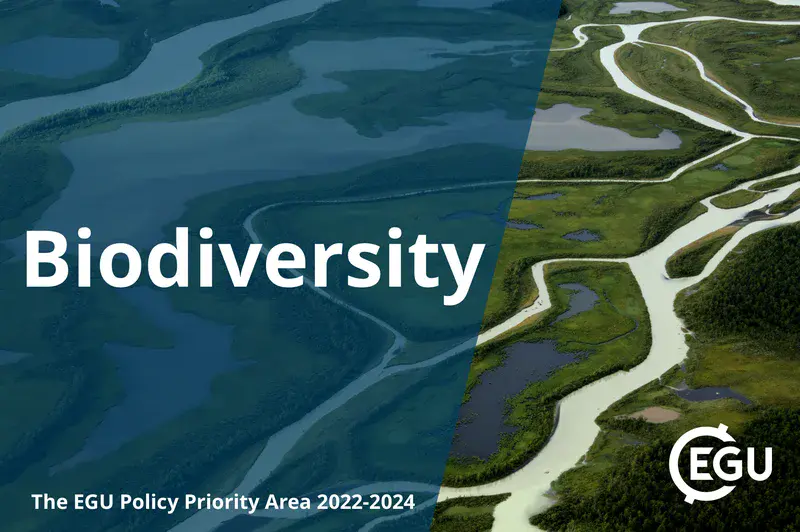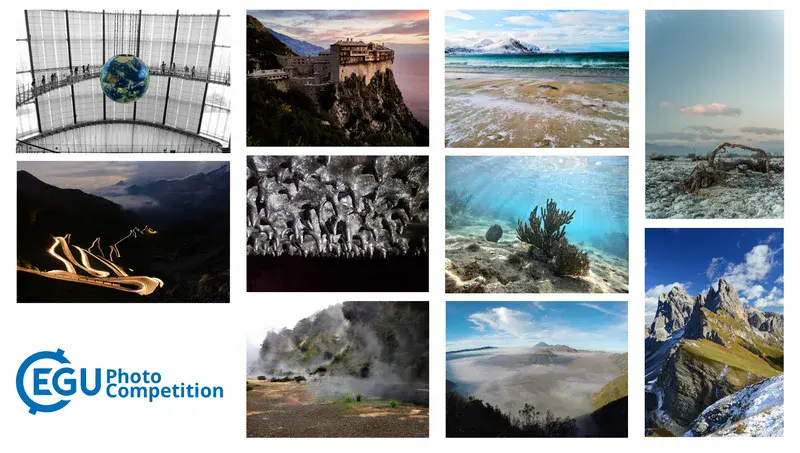
Highlights at a glance
- 08:30 – Scales and Scaling in the Climate System (SC4.11: Room -2.61/62; Fluid Flow in the upper crust: geysers, hydrothermal vents, mud volcanoes and cold seeps (GMPV6.3/BG7: Room -2.16)
- 10:20 – How to navigate the EGU: tips and tricks (SC1.1: Room -2.61/62); Towards an academic evaluation system that celebrates diversity of talent (GDB1: Room E1)
- 12:00 – EGU Plenary (PCN2: Room E1)
- 13:20 – The role of the geosciences in preserving and restoring biodiversity (US2: Room E1); Palaeoclimate modeling: from time-slices and sensitivity experiments to transient simulations into the future (CL5.3.1/BG5/NP4/OS1: Room F2)
- 15:10 – How to build and grow your scientific network (SC2.6: Room -2.61/62); Linking ice sheets, solid Earth and sea levels – observations, analysis and modelling of glacial isostatic adjustment (G3.3/CL5.2/CR4/GD2/GM10/NP8: Room -2.16);
- 17.00 – Rhyme Your Research (SC3.8: Room -2.61/62); Crowd-solving Problems in Earth science (SC4.2: Room -2.85/86); Machine learning for Earth System modelling (ITS2.6/AS5.1/CL5.3/ESSI1/NP4/OS4: Room N1); Fixed-term contracts: opportunity or exploitation? (GDB6: 17:00–18:30 (CEST) Room E1)
- 18.30 – Division meeting for Earth Magnetism & Rock Physics (EMRP) (DM9: Room -2.31)
Welcome message from the EGU Programme Committee Chair
Welcome to the EGU General Assembly! The Programme Committee is proud to present an exciting and diverse programme that covers the widest range of Earth, planetary and space sciences. Despite having to overcome several challenges this year, we are very excited to welcome you to our first ever hybrid General Assembly, taking place both on-site in Vienna and virtually around the world. After two long years away we are delighted to be back in our host city with a programme that includes 614 scientific sessions, 53 short courses, 10 union-wide Union Symposia and Great Debates, 35 Medal and Award lectures, as well as the Job Centre, Artists in Residence and much, much more.
We hope this week will offer you great opportunities for building new collaborations and enhancing existing joint research in open discussions. We know that this year will be a very different experience for many of you, not just because of the different format, but also because of the COVID-19 requirements that have been put in place to keep everyone safe. We thank all our attendees for showing care and respect to their fellow EGU22 participants, by following these regulations closely throughout the week.
We strive for the EGU General Assembly to be open and inclusive. We are actively working on conference accessibility and you can once again find quiet rooms, a breastfeeding room and prayer rooms on the purple level. Please stop by the EGU Booth in Hall X5 to give us your feedback and learn more about EGU and how you can help us provide the best Union and conference for you. I wish you an enjoyable and fruitful week!
Peter van der Beek, EGU Programme Committee Chair 2022

The role of the geosciences in preserving and restoring biodiversity
Preserving and restoring biodiversity are incredibly complex tasks that will require both scientific expertise and intersectoral collaboration. This Union Symposium will highlight some of the key biodiversity challenges that humanity is currently facing and how they can potentially be overcome. It will also outline some of the recent European biodiversity targets and legislation, what’s coming next, how geoscience is being used to find solutions, and where more research is needed. The panel will include geoscientists working in areas related to biodiversity and policymakers who are currently working on European biodiversity initiatives. While this session will have a European focus, it will also emphasise the importance of biodiversity as a global issue.
US2: 13:20–14:50 (CEST) Room E1
Medal lectures
- Ian McHarg Medal Lecture by Mikhail Kanevski: ‘On Machine Learning from Environmental Data’ (MAL16/ESSI: 19:00–20:00 (CEST) Room 0.31/32)
- Julia and Johannes Weertman Medal Lecture by Regine Hock: ‘Future global glacier mass changes and their impact on sea level and streamflow’ (MAL19/CR: 19:00–20:00 (CEST) Room L3)
- Sergey Soloviev Medal Lecture by Anne Mangeney: ‘Challenges in physical modeling of landslides, glaciers, and generated seismic and tsunami waves for hazard assessment’ (MAL28/NH: 19:00–20:00 (CEST) Room 1.61/62)
- Vilhelm Bjerknes Medal Lecture by Hugh Coe: ‘Aerosol composition, climate and air quality, why molecular scale observations are important and what are the future challenges’ (MAL30/AS: 19:00–20:00 (CEST) Room F1)
- Vladimir Ivanovich Vernadsky Medal Lecture by Adina Paytan: ‘Atmospheric Deposotion Impacts on Marine Biogeochemistry’ (MAL31/BG: 19:00–20:00 (CEST) Room C)
- Division meeting for Earth Magnetism & Rock Physics (EMRP) (DM9: 18:30–19:30 (CEST) Room -2.31)
Short courses, networking and early career scientist events
- Scales and Scaling in the Climate System (SC4.11: 08:30–10:00 (CEST) Room -2.61/62
- How to navigate the EGU: tips and tricks (SC1.1: 10:20–11:50 (CEST) Room -2.61/62)
- How to make a beautiful study area map with QGIS? (SC5.1: 10:20–11:50 (CEST) Room -2.85/86)
- Scared of giving presentations? (SC3.6: 13:20–14:50 (CEST) Room -2.85/86)
- Geoethics for Earth, Marine and Atmospheric Sciences (SC4.1: 13:20–14:50 (CEST) Room -2.61/62
- How to build and grow your scientific network (SC2.6: 15:10–16:40 (CEST) Room -2.61/62)
- The scientific poster needs attention 2.0 – Understanding the design principles applied on the scientific poster (SC3.4: 15:10–16:40 (CEST) Room -2.85/86)
- Mapping Personal Landscapes (on-site only) (SC3.14: 15:10–16:40 (CEST) Room 0.15)
- Rhyme Your Research (SC3.8: 17:00–18:30 (CEST) Room -2.61/62)
- Crowd-solving Problems in Earth sciences (SC4.2: 17:00–18:30 (CEST) Room -2.85/86)
EGU plenary
This session (PL1) is the annual meeting held during every General Assembly to recognise and thank the outgoing volunteer Division Presidents and other Union officers and to introduce and welcome the new ones! Join us in Room E1 (yellow level) from 12:00 (CEST) today.
Fluid Flow in the upper crust: geysers, hydrothermal vents, mud volcanoes and cold seeps
Fluid flow in the Earth’s crust is driven by pressure gradients and temperature changes induced by internal heat. The expression of crustal fluid flow is associated with a range of structural and geochemical processes, which have played a key role in the evolution of our planet and even create ideal natural laboratories for many dynamic geological processes. This session will examine a number of these phenomena at various scales.
GMPV6.3/BG7: Presentations / 08:30–11:50 (CEST) Room -2.16
Towards an academic evaluation system that celebrates diversity of talent
Over the past few years, criticism on the singularly focused metrics evaluation of scientists has grown, making it clear that a cultural shift is needed to modernise our assessment system. For several decades, quantitative indices have served as near-singular measures of scientific success, while other key skills, such as education, leadership, and engagement have been undervalued. By allowing for more diversity in academic career paths and a broader definition of what constitutes scientific excellence, there would be more options for honoring and nurturing individual talents. Many opponents of a revised assessment system, however, fear that moving away from quantitative measures will make it more difficult to objectively assess and compare academics, leading to a loss of quality. This Great Debate will discuss the different ideas at the intersection of these two perspectives, asking if there can be an academic evaluations system that measures all necessary skills?
GDB1: 10:20–11:50 (CEST) Room E1

EGU22 Photo Competition – VOTING OPEN!
Voting has opened today for the twelfth annual EGU Photo Competition! Ten creative and curious images were selected from 100’s of entrants for this year’s contest on the imaggeo website, in the hopes of being voted one of the top three photos of the year, awarding the winner with free registration to next year’s meeting. The winners are selected by you and voting is open until 18.00 (CEST) on Thursday 26 May. Winners are announced on Friday on the EGU blog, geolog.egu.eu, and on screens around the conference centre.
Palaeoclimate modeling: from time-slices and sensitivity experiments to transient simulations into the future
Palaeoclimate modelling is a challenging endeavour, not just due to the vast time scales that are often involved, but also the range of climate conditions that need to be incorporated. This session includes studies on model development, simulations and model-data comparisons, in an attempt to better simulate the past and facilitate future climate projections.
CL5.3.1/BG5/NP4/OS1: Presentations / 13:20–14:50 (CEST) Room F2
New frontiers of multiscale monitoring, analysis, modeling and decisional support (DSS) of environmental systems
Environmental systems often span spatial and temporal scales covering different orders of magnitude. The session is oriented toward collecting studies relevant to understand multiscale aspects of these systems and in proposing adequate multi-platform and inter-disciplinary surveillance networks monitoring tools systems.
GI6.3/AS5/CL5.3/ERE1/ESSI4/GD9/NH6/NP3: Presentations / 15:55–18:30 (CEST) Room 0.51
Multi-scale water-energy-land nexus planning to manage socio-economic, climatic, and technological change
How can we better characterise the energy-water-land nexus to guide robust and consistent decision making across global, regional and even sub-regional scales, under the socioeconomic, demographic, climatic, and technological pressures of a swiftly changing climate? This session aims to address this challenge for the energy-water-land nexus in nascent infrastructure planning and sectoral transitions.
HS5.5/ERE1: Presentations / 13:20–14:26 (CEST) Room 3.29/30
Linking ice sheets, solid Earth and sea levels – observations, analysis and modelling of glacial isostatic adjustment
Glacial Isostatic Adjustment (GIA) describes the dynamic response of the solid Earth to ice sheet glaciation/deglaciation, which affects the spatial and temporal sea level changes, and induces surface deformation, gravitational field variation and stress changes in the subsurface. This session draws on observational data in order to better investigate the interactions between the ice sheets, solid Earth and sea levels.
G3.3/CL5.2/CR4/GD2/GM10/NP8: Presentations / 15:10–18:28 (CEST) Room -2.16
Fixed-term contracts: opportunity or exploitation?
Fixed-term and temporary contracts are common in academia, and have often been promoted as way for Early Career Scientists to broaden their networks and enhance scientific exchange, collaborations, and innovation. However, in recent years the focus has been shifting more towards the negative impacts of fixed-term contracts and the inequity with which this type of employment affects our community. This Great Debate seeks to examine fixed-term contracts, for both their positive and negative aspects.
GDB6: 17:00–18:30 (CEST) Room E1
ESA Living Planet Symposium 2022
Held on 23–27 May 2022 in Bonn, Germany, the Living Planet Symposium brings together scientists and researchers, as well as industry and users of Earth observation data, from all over the world to present and discuss the latest findings on Earth science and how satellite data support environmental research and action to combat the climate crisis. The symposium also focuses on emerging space technologies and the new opportunities emerging in the rapidly changing sector of Earth observation.
Watch their Opening Ceremony, live from EGU22 09.00-12.00 (CEST), Hall A
Machine learning for Earth System modelling
Machine learning could help extract information from numerous Earth System data, such as in-situ and satellite observations, as well as improve model fidelity through novel parameterisations or speed-ups. This session provides an overview of the state-of-the-art of application of these novel methods for predicting and monitoring our Earth system.
ITS2.6/AS5.1/CL5.3/ESSI1/NP4/OS4: Presentations / 17:00–18:30 (CEST) Room N1 (additional presentations on Tuesday)
About
EGU Today helps you keep up with the many activities at the General Assembly by highlighting sessions and events from the programme. If you have comments, email the editor Hazel Gibson at communications@egu.eu. The newsletter is available at https://www.egu.eu/egutoday/ and on screens around the conference centre.
The Assembly Online
LinkedIn
Instagram
YouTube
Facebook
Mastodon
Bluesky
blogs.egu.eu, geolog.egu.eu
www.egu.eu